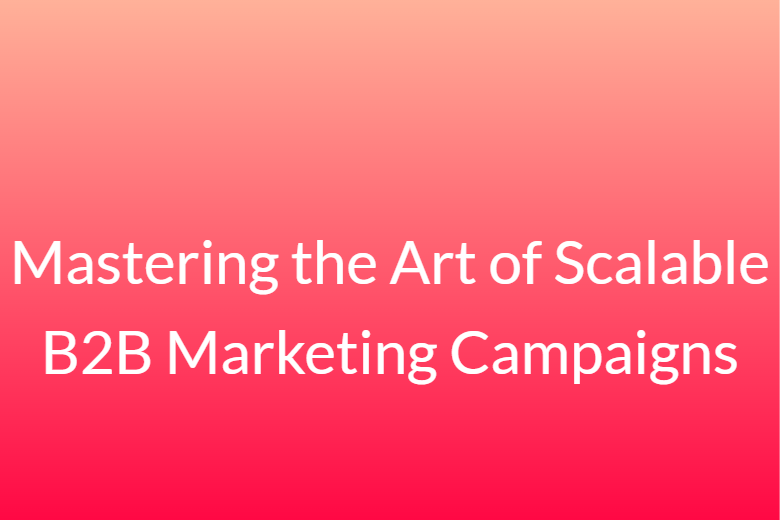Crafting Scalable B2B Marketing Campaigns for Long-Term Growth
Scalability is a key factor in building sustainable and results-driven B2B Marketing Campaigns. As companies grow and their target markets expand, it becomes essential to execute campaigns that can reach wider audiences without compromising personalization or performance. Successful B2B marketers understand how to combine automation, strategic planning, and performance analysis to achieve scalability without sacrificing engagement.
From the outset, campaign frameworks should be designed with replication and adaptability in mind. Whether you’re targeting new geographic markets or launching product-specific campaigns, a scalable approach ensures efficiency and consistency across all initiatives.
Structuring a Campaign Framework That Grows With You
A repeatable campaign framework is essential for scaling efforts across regions, industries, or product lines. A well-structured B2B marketing campaigns framework typically includes planning, messaging development, asset creation, channel mapping, deployment, and performance tracking.
Once this framework is established, it can be reused and customized for various campaign objectives. For instance, an event-driven campaign can adopt the same core structure but adjust assets and targeting parameters based on location, industry trends, or audience segmentation.
Leveraging Content Modularization for Efficient Campaigns
Content modularization allows marketers to build flexible content blocks that can be reused across multiple B2B marketing campaigns. Instead of creating each piece of content from scratch, marketers develop modular assets—headlines, testimonials, statistics, product highlights—that can be mixed and matched for different campaigns and personas.
This approach improves consistency in messaging while reducing production time and resource consumption. It also enables rapid deployment of personalized content variations based on buyer stage, industry, or behavioral triggers.
Automating Campaigns Without Losing Personalization
Automation is a powerful tool in scaling B2B marketing campaigns, but it must be used thoughtfully. Marketing automation platforms allow teams to automate email workflows, scoring models, lead routing, and campaign nurturing, but personalization should never be sacrificed.
The best-performing campaigns utilize behavioral triggers, dynamic content, and segmentation logic to ensure that automated messages still feel tailored to the recipient. Tools like HubSpot, Marketo, and Pardot provide functionality to manage large-scale automation while maintaining a high degree of relevance.
Channel Selection for Scalable Visibility
For B2B marketing campaigns to scale effectively, the choice of marketing channels is critical. Each platform offers different targeting capabilities, formats, and engagement behaviors. Email, LinkedIn, display ads, content syndication, and webinars are among the top-performing B2B channels.
Scalable campaigns rely on orchestrating these channels to work together in sync. This ensures consistent messaging and brand presence regardless of where the prospect engages. Centralized campaign management platforms help marketers coordinate messaging, creative, and performance metrics across all active channels.
Utilizing Campaign Templates to Accelerate Execution
Campaign templates help marketing teams streamline repetitive tasks and ensure quality control across all B2B marketing campaigns. These templates can include email sequences, landing page layouts, campaign briefs, asset checklists, and reporting dashboards.
By using templates, marketers save time and reduce inconsistencies. Templates also support faster training of new team members and allow campaigns to be launched more quickly across departments, regions, or verticals.
Budget Allocation Strategies for Scalable Campaigns
Budget management is crucial for running multiple concurrent B2B marketing campaigns. Scalable strategies require precise budget allocation across different initiatives, ensuring that high-performing campaigns receive more investment while underperforming ones are optimized or retired.
Marketers must assess the cost per lead, cost per acquisition, and return on ad spend (ROAS) regularly. Dynamic budget reallocation based on real-time performance data helps drive efficiency. Predictive analytics tools can also assist in forecasting campaign performance before launch.
Building Internal Campaign Playbooks for Consistency
Internal playbooks guide team members on how to plan, launch, and optimize B2B marketing campaigns effectively. These playbooks can outline key messaging frameworks, tone of voice, buyer personas, design guidelines, and distribution strategies.
Having standardized playbooks reduces miscommunication and enables all stakeholders—from content creators to performance analysts—to align their efforts. Playbooks also help maintain brand integrity across different business units or global offices.
Partnering With Sales Teams to Amplify Campaign Success
Cross-functional collaboration is essential for scaling B2B marketing campaigns successfully. Sales and marketing alignment ensures that leads generated by campaigns are followed up with the right messaging and timing. Sales teams can also provide feedback on lead quality and buyer behavior, informing campaign improvements.
Joint campaign planning, shared dashboards, and lead nurturing protocols enable a smoother handoff between marketing and sales. As campaigns scale, this alignment becomes even more critical to maintaining lead quality and conversion rates.
Optimizing for Localization and Global Expansion
As businesses expand internationally, their B2B marketing campaigns must adapt to regional and cultural differences. Localization involves more than just translation—it includes adapting messaging, visuals, and delivery formats to align with local expectations and business norms.
Working with regional marketing teams or partners helps ensure authenticity. Scalable campaigns should be built with localization in mind from the beginning, using flexible design templates, modular content, and universal messaging structures that can be adapted without redesign.
Performance Tracking at Scale: Tools and Metrics That Matter
Scalable B2B marketing campaigns demand sophisticated tracking tools to monitor effectiveness across various audience segments and platforms. Centralized dashboards offer real-time visibility into KPIs like lead generation, funnel progression, engagement rates, and revenue attribution.
Using UTM parameters, campaign tagging, and CRM integration allows marketers to trace lead sources and understand which touchpoints contribute most to conversions. This visibility supports data-driven scaling by highlighting which campaign elements deserve further investment.
Read the Full Blog Now @ https://acceligize.com/featured-blogs/impactful-b2b-marketing-campaigns-guide/
About Us
Acceligize is a global leader in B2B demand generation and lead nurturing services. Our expertise bridges the gap between marketing and sales functions, delivering measurable outcomes through intent-based targeting, content syndication, and innovative outreach strategies. With our future-ready solutions, we help businesses scale pipeline performance and accelerate revenue growth. Partner with Acceligize to transform your lead generation strategy in 2025 and beyond.
